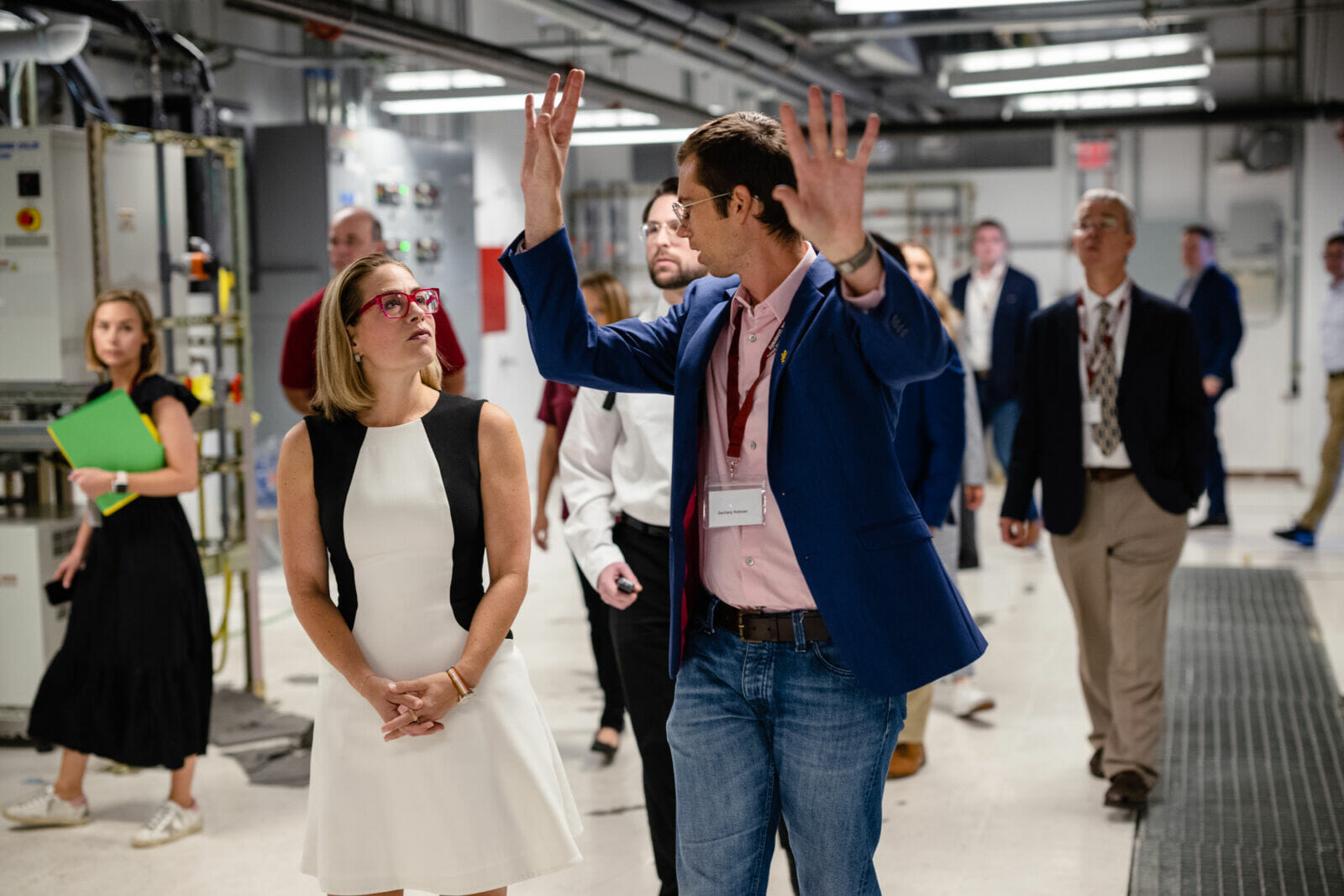On Oct. 17, U.S. Senator Kyrsten Sinema toured Arizona State University’s (ASU) MacroTechnology Works facility to see how her bipartisan CHIPS and Science Act will support semiconductor manufacturing and research in Arizona. Sinema notes that Arizona’s roots in microelectronics are deep — with Motorola coming to Arizona in 1949 — and growing, as evidenced by significant investments from companies such as Taiwan Semiconductor Manufacturing Company and Intel.
This, combined with ASU having the largest engineering school in the nation, makes the Grand Canyon State a top contender in a critical industry.
“We’ve got the right economic climate, and we’ve got the right brain trust for us to be not just a regional hub, but a national and international competitor,” Sinema says. “Arizona is well poised to do that, not just because of our history, but because of the foresight that folks like ASU President Michael Crow and business leaders have shown in creating this groundswell for microchip processing.
“With the passage of the CHIPS and Science Act,” she continues, “the U.S., through its government and our partners in the private community, are making a concerted effort to bring microchip processing and manufacturing back to the United States of America, not just for economic reasons, but for national security reasons as well.”
READ MORE: How Arizona’s semiconductor industry benefits from policy, partnerships
The CHIPS and Science Act, Sinema adds, goes beyond incentives for corporations to onshore production. It also has major investments in tooling and manufacturing, as well as authorizing funds for research, science and technology hubs throughout the country.
“The idea is to create an ecosystem for us to be able to do microchip processing and creation from soup to nuts,” she says.
Homegrown innovation
To support such an ecosystem, investing in education across all levels is crucial. Community colleges are sometimes overlooked but play an integral role in preparing students for careers of all kinds, including in highly technical fields such as semiconductor manufacturing.
“I was a community college graduate myself,” Sinema says. “That pipeline is important, especially for kids from middle class and working-class families. I come from a family of poverty, and [community college] provided a steppingstone to higher education.”
The community colleges in Arizona have long coordinated with nearby state universities to make the transition between institutions smooth for students, but they work together in other ways to meet the needs of learners and the business community. ASU, for example, is partnering with Rio Salado College’s associates degree program in microelectronics and semiconductor manufacturing.
Students take classes online through Rio Salado College, then come to ASU to utilize cleanroom facilities like the ones at the MacroTechnology Works — which itself serves as an accelerator for semiconductor, advanced materials and energy device research.
READ MORE: Cleanroom construction mirrors semiconductor growth

During the tour, Sinema spoke with multiple businesses utilizing the facility, including Peter Firth, co-founder of Swift Coat. The company creates products using aerosol impact driven assembly, a scalable and precise method for integrating nanomaterials into large area, high throughput manufacturing processes.
“Our first product is a self-cleaning coating for solar panels,” Firth explains. “When a solar panel gets dirty, it produces 30% less power. For the average Arizona solar owner, that’s enough lost energy over the course of a month to power their air conditioner for 52 hours. Globally, this is a massive problem, with $6 billion in potential energy lost last year. Our solution is a nanoparticle-based coating that uses UV light from the Sun to power chemical reactions decompose the dirt that builds up on the panel, keeping it clean and operating efficiently.”
In closing, Sinema reiterates the economic boon for Arizona borne out of the CHIPS and Science Act and its national security implications.
“It’s important for us to be able to onboard all of this — from [ideation] to manufacturing to production — throughout the country, so that we’re protecting that knowledge and those assets, and so we’re not dependent on countries who don’t share our national interests, such as China, for the provision and the manufacturing of these tools.”




